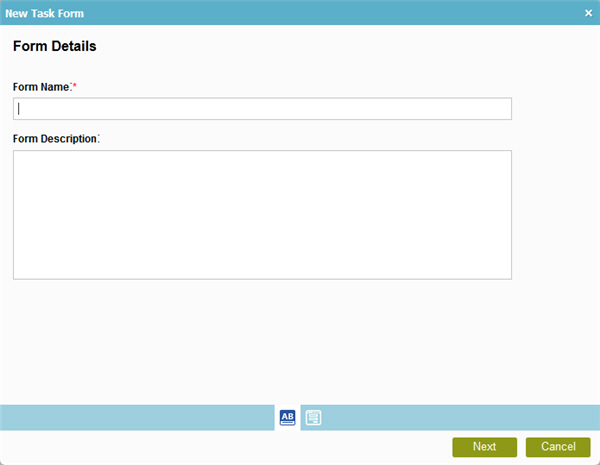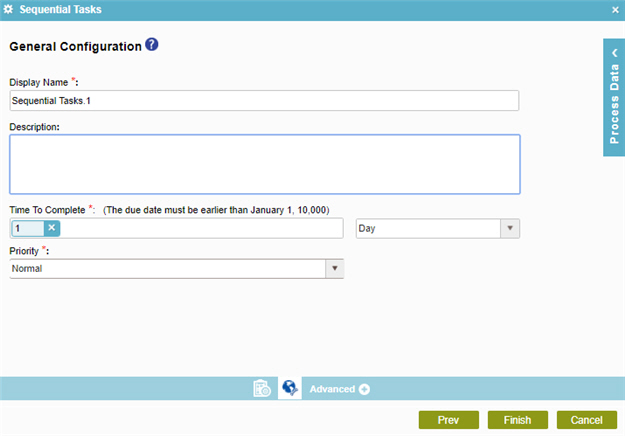Sequential Tasks (eForms) activity
An activity that, when the process runs, shows a form made with eForms that must be completed by 1 or more participants in order. The activity is designed to be used as part of a loop in a process, so that the process flow returns to this activity until a sufficient number of participants have completed the task, or until some other condition ends the loop, and the process continues..

Configure the Sequential Tasks (eForms) activity
To configure the Sequential Tasks (eForms) activity, do the procedure in this topic.
Video: Create Your First eForm
Examples
- (Example) Create a Sequential Approval Task
- Examples - Step-by-step use case examples, information about what types of examples are provided in the AgilePoint NX Product Documentation, and other resources where you can find more examples.
Good to Know
- The functionality for the Parallel Tasks and Sequential Tasks activities are included in the Advanced Task activity. The Parallel and Sequential Tasks activities exist to support apps created in older versions of AgilePoint NX and AgilePoint BPMS. If you are creating a new app, or changing an existing app, use the Advanced Task activity.
For more information, refer to Advanced Task (eForms) activity.
- In most text fields, you can use process data variables as an alternative to literal data values.
- Use a Standard Task activity only if you do not want the form to start the process. If you want your form to start the process, use the Start Task (eForms) activity or Start Task (External Forms) activity.
How to Start
- On the Application Explorer screen, do one of these:
- Do one of these:
- Add an activity:
- In the Process Builder, in the Activity Library,
open the eForms
 tab.
tab. - On the eForms
 tab,
drag the Sequential Tasks (eForms)
tab,
drag the Sequential Tasks (eForms)  activity onto your process.
activity onto your process.
- In the Process Builder, in the Activity Library,
open the eForms
- Change an activity:
- In your process, double-click your activity.
- Add an activity:
Procedure
- On the Sequential Tasks Configuration screen, do one of these
- Select the form that exists.
- Create a new task form.
- Click Add New Form.
- Complete the fields on the
Form Details screen.
For more information, refer to Create a Human Task with eForms.
- Click General Configuration
 .
. - Complete the fields on the General Configuration screen.
- (Optional) If you want to let a runtime app user submit the form with anonymous authentication, click Advanced
 > Anonymous Access
> Anonymous Access  .
. For more information, refer to (Example) Use Anonymous Authentication in a Process-Based App.
- (Optional) When the task changes status, you can send notifications using e-mail, Yammer, Salesforce Chatter,
Skype for Business, or
SMS:
- To send an e-mail notification, click
Advanced
 >
E-mail Notifications
>
E-mail Notifications  .
. For more information, refer to Configure E-mail Notifications for Any Activity.
- To send a notification with Yammer, click Advanced
 > Yammer Notifications
> Yammer Notifications  .
. For more information, refer to Configure Yammer Notifications for Human Tasks.
- To send a notification with Salesforce Chatter, click Advanced
 > Chatter Notifications
> Chatter Notifications  .
. For more information, refer to Configure Salesforce Chatter Notifications for Human Tasks.
- To send a notification with Skype for Business, click Advanced
 >
Skype for Business
>
Skype for Business  .
.
For more information, refer to Configure Skype for Business Notifications for Human Tasks.
- To send a notification with SMS, click Advanced
 >
SMS Notifications
>
SMS Notifications  .
.
For more information, refer to Configure SMS Notifications for Human Tasks.
- To send an e-mail notification, click
Advanced
Form Details screen
Configures a new human task form.

Fields
| Field Name | Definition |
|---|---|
|
Form Name |
|
|
Form Description |
|
|
Next |
|
General Configuration
Specifies the general information for the Sequential Tasks activity.

Fields
| Field Name | Definition |
|---|---|
|
Display Name |
|
|
Description |
|
|
Time to Complete |
|
|
Priority |
|





